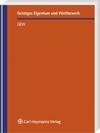Details

Laub, Christoph
Legal Validity as a Worldwide Quality Standard for Patent Offices
A concept for systematic analysis of patent validity related jurisprudencewith a special focus on the European Patent System
Carl Heymanns
978-3-452-27831-9
1. Aufl. 2013 / 286 S.
Monographie/Dissertation
Kurzbeschreibung
Reihe: Schriftenreihe zum gewerblichen Rechtsschutz. Band: 31
The boards of appeal and patent courts of the world's leading patent systems annually pass judgement in more than 12,000 cases originating from decisions made at the first instance. These judgements constitute a statistically significant resource of final opinions relating to the quality of the work of the legal authorities and the patent attorney profession, but one that has so far not been systematically exploited by the patent offices. To date, no reliable legal or econometric approach to the numerical determination of the legal validity of patent decisions appears to exist. Reasons for this reluctance might also relate to alleged difficulties of direct (ex-ante) comparability of a second instance judgment with respect to the subject matter of the disputed original decision of the first instance.
The present work shows a systematic method for efficient legal analysis of large numbers of second instance judgments, providing a way to express the validity of the contested decisions in quantitative terms. The methodology developed allows the teaching of the judgement to be studied ex-ante with reference to the subject and wording of the disputed decision. Also taken into account for the approach is the aspect of the statistical representativeness of the contested decision amongst the total population of all first instance decisions. It is thus demonstrated that highly reliable and cost efficient metrics can be used to check the validity of the work of the executive authority.
The approach, has been tested and optimised by the author, based on the analysis of 2,300 appeal decisions, while working as a project manager at the European Patent Office. Finally, the present thesis shows that the legal theories and principles developed can be equally applied to comparative legal validity studies amongst the Chinese, German, Japanese, Korean and US-American patent systems.
Luxemburger Str. 449
50939 Köln
0221 / 943 730
vertrieb@heymanns.com
